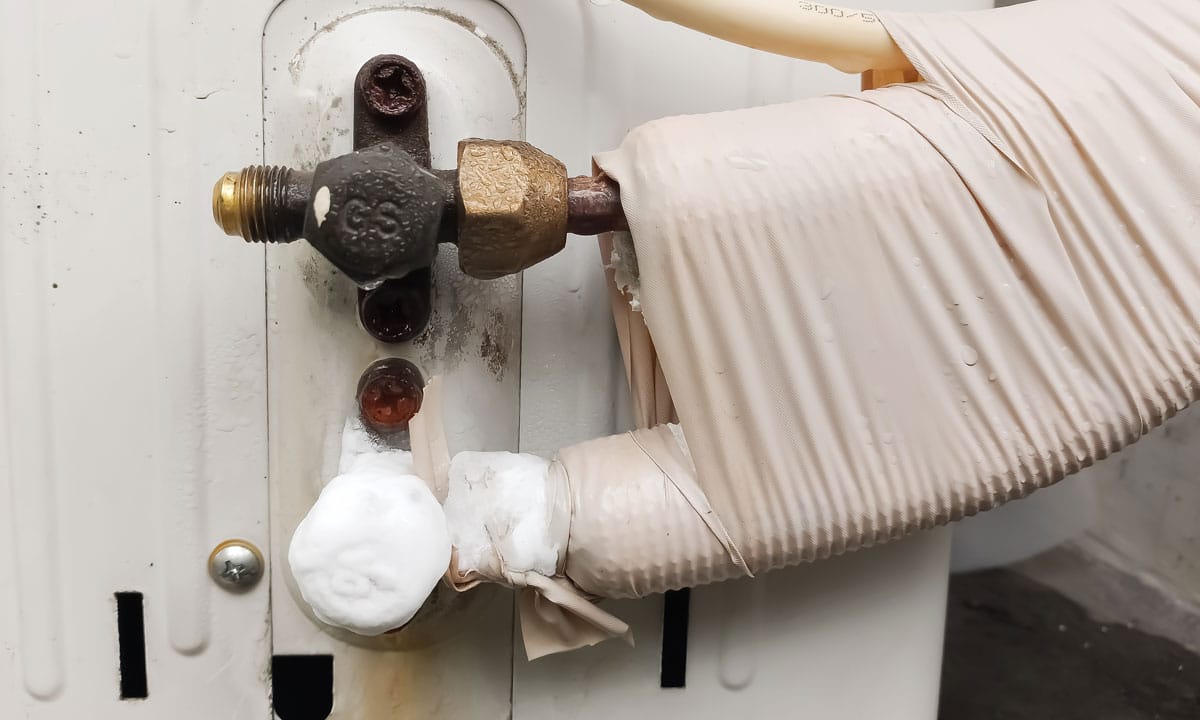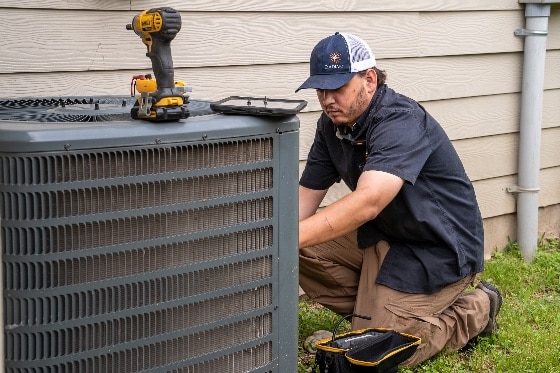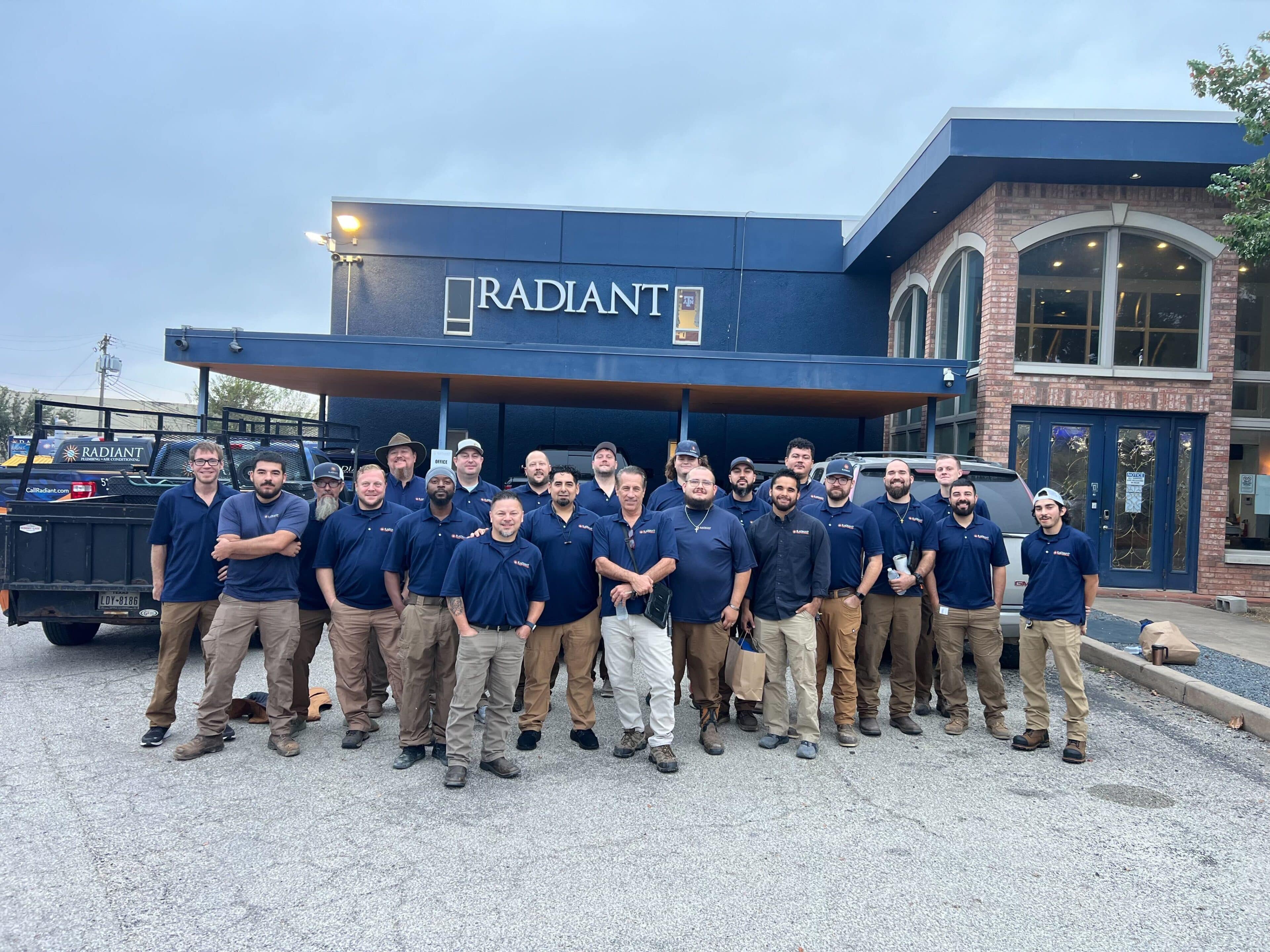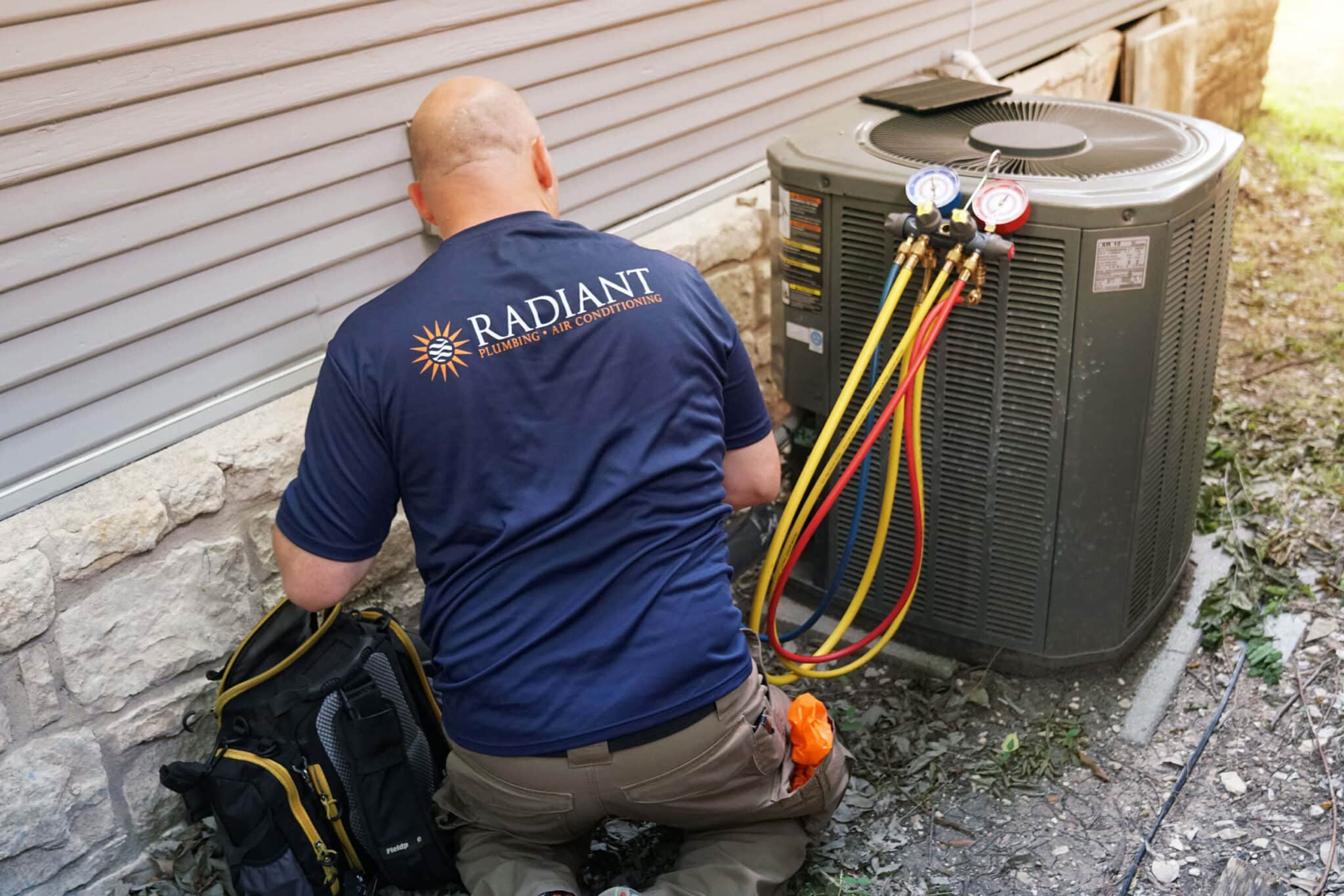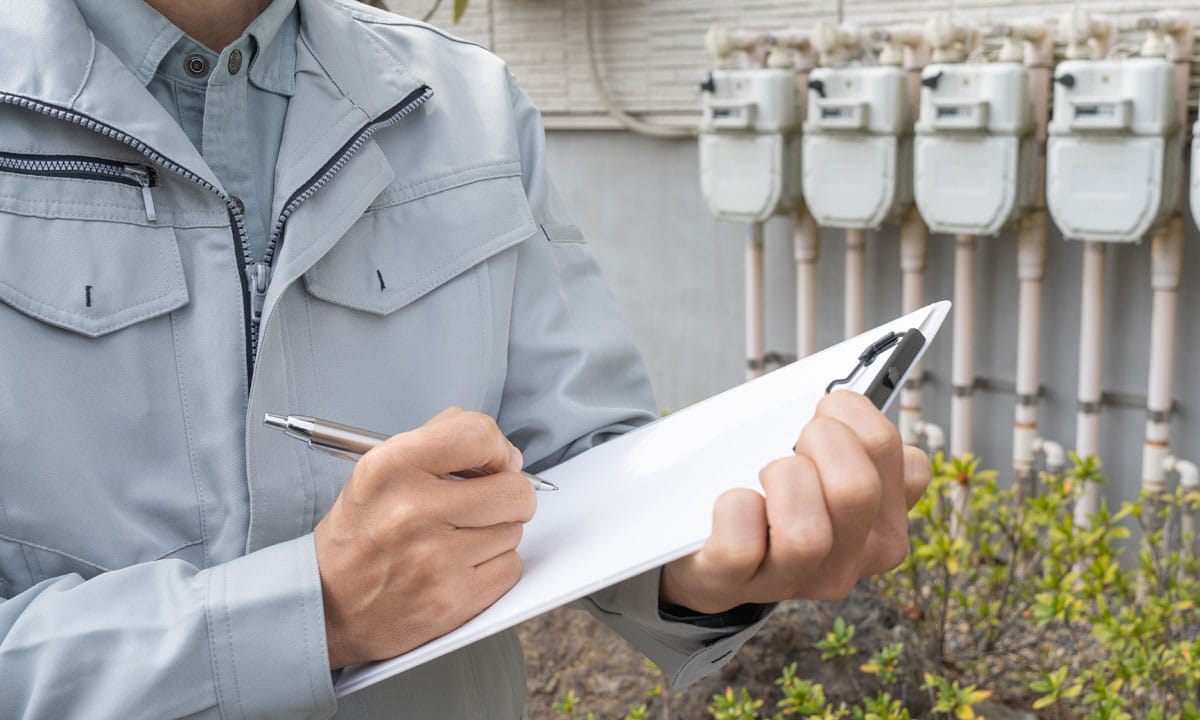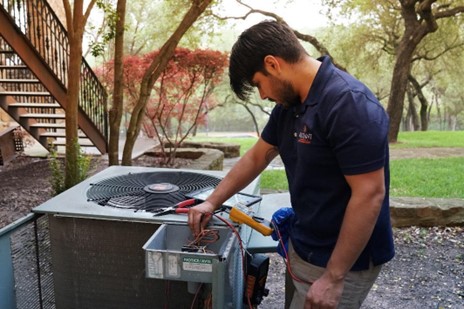When temperatures start climbing in Texas, air conditioners go from months of near-dormancy to working overtime. That sudden shift can put serious strain on your system, leading to higher energy bills, uneven cooling, or even a full AC breakdown just when you need it most. If your AC isn’t in peak condition, you could be facing long waits for emergency repairs—or worse, days of discomfort in triple-digit heat.
The good news? Most AC problems start small, and early maintenance can prevent costly repairs down the road. By understanding the most common air conditioning issues and how to address them, you can keep your home cool, efficient, and comfortable all season long.
Common Spring AC Problems
Many air conditioners struggle when switching from cooler months to warmer weather. Catching problems early can keep a home cool and comfortable all season.
Low Refrigerant Levels
Refrigerant cools the air, but leaks can develop from regular wear and tear. Without enough refrigerant, an AC system won’t cool properly.
- Signs of low refrigerant: Warm air from vents, longer cooling cycles, and ice buildup on refrigerant lines.
- Causes of refrigerant leaks: Corrosion in the lines, loose connections, or damage from severe weather.
- Solution: A technician needs to find and fix leaks before recharging the system to the correct level.
Clogged Drain Lines
Pollen, dust, and mold can block the AC drain line, causing water buildup and system malfunctions. A clogged drain prevents proper humidity removal, making a home feel warmer.
- Signs of a clogged drain line: Water pooling near the indoor unit, musty odors, and higher indoor humidity.
- Causes of drain blockages: Mold growth, dirt buildup, and debris caught in the line.
- Solution: Professional cleaning clears blockages, preventing mold, water damage, and system failures.
Thermostat Issues
A thermostat controls when an air conditioner turns on and off. If it’s not calibrated correctly, the system may run inconsistently or cycle too often.
- Signs of thermostat problems: Uneven cooling, frequent cycling, or unresponsiveness.
- Causes of miscalibration: Aging parts, electrical interference, or improper installation.
- Solution: A technician can recalibrate or replace the thermostat for accurate temperature control.
Why AC Capacitors Fail in Spring
Capacitors store and release electrical energy to help an air conditioner’s motors start and run. When a capacitor fails, the system may have trouble turning on or operating properly.
Overheating from Rising Temperatures
Capacitors are sensitive to heat, and higher temperatures put extra stress on them. Prolonged exposure to heat can cause failure, preventing the system from starting.
- Signs of an overheating capacitor: The AC struggles to start, makes a humming sound, or doesn’t cool effectively.
- Causes of overheating capacitors: Direct sunlight on the outdoor unit, poor ventilation, or overuse during peak heat.
- Solution: A technician can check if the capacitor needs replacing before it leads to motor failure.
Wear and Tear from Last Summer
An air conditioner works hard during the hottest months, and the strain can weaken internal parts. Capacitors that barely made it through last summer may start failing when the system kicks back on in spring.
- Signs of capacitor strain: Frequent short cycling, difficulty maintaining temperature, or unexpected shutdowns.
- Causes of capacitor wear: Aging components, excessive workload, and constant exposure to heat.
- Solution: A spring AC tune-up can catch early signs of capacitor failure before summer arrives.
Electrical Surges and Power Fluctuations
Storms and electrical grid fluctuations can send voltage spikes through an air conditioner, burning out the capacitor.
- Signs of electrical damage: The AC won’t turn on, repeatedly blows fuses, or runs inconsistently.
- Causes of power surges: Lightning strikes, unstable power supply, or faulty home wiring.
- Solution: Installing a surge protector and scheduling an electrical inspection can protect capacitors from voltage spikes.
Signs Your AC Needs Immediate Attention
An air conditioner often gives warning signs before breaking down entirely. Paying attention to these signals can help avoid costly repairs.
Longer Cooling Times
An AC system should cool a home within a reasonable timeframe. If it’s taking much longer, something may be affecting efficiency.
- Causes of extended cooling times: Low refrigerant, restricted airflow, or capacitor failure.
- Solution: A professional inspection can find leaks, electrical problems, or worn-out parts.
Short Cycling
If the AC turns on and off too often, it may have a failing capacitor, refrigerant imbalance, or thermostat issue.
- Causes of short cycling: A weak capacitor that can’t regulate power, an oversized AC unit, or thermostat malfunctions.
- Solution: A technician can check electrical connections, capacitors, and refrigerant levels to restore normal operation.
Unusual Noises
Humming, buzzing, or clicking sounds from an AC unit often signal electrical issues, capacitor trouble, or motor problems.
- Causes of strange noises: Electrical arcing, capacitor failure, or a struggling compressor motor.
- Solution: A professional inspection can prevent more damage and keep the system running.
The Importance of Professional Maintenance
Regular maintenance keeps an AC running efficiently and lowers the risk of sudden breakdowns.
Preventative Care Saves Money
Small problems can turn into expensive repairs if they’re ignored. Catching issues early prevents system failure.
- Causes of unexpected repairs: Lack of maintenance, ignored warning signs, or aging parts.
- Solution: A professional tune-up can identify minor problems before they become major expenses.
Expert Technicians and Proper Equipment
HVAC repairs require specialized tools and knowledge. A trained technician can quickly find and fix problems.
- Causes of DIY repair failures: Inexperience, incorrect diagnosis, or improper electrical work.
- Solution: Professional technicians can troubleshoot and repair AC components without risking further damage.
Safety Risks of DIY Repairs
HVAC systems have high-voltage electrical parts that can be dangerous without proper training. Replacing a capacitor incorrectly can cause electrical shocks or further damage.
- Causes of safety hazards: High-voltage charges in capacitors, improper wiring, or refrigerant mishandling.
- Solution: Licensed professionals have the training to make safe, effective repairs.
How Radiant Can Fix Your AC Fast
Reliable service ensures homeowners get their cooling system back up and running quickly.
Emergency AC Repair Services
Unexpected breakdowns need fast attention, especially when temperatures are high.
- Solution: Just Call Radiant for 24/7 emergency repairs and quick service.
Comprehensive Maintenance Plans
Routine maintenance prevents sudden failures and extends the life of an AC system.
- Solution: The Radiant Care Club includes regular inspections and priority service to keep AC units running efficiently.
Experienced Technicians in Austin and San Antonio
Local experts understand the unique challenges of Texas heat and provide solutions tailored to the region.
- Solution: Radiant’s experienced technicians deliver dependable, high-quality service.
Be Proactive This Spring
Preparing an air conditioner for warmer months helps prevent discomfort and breakdowns.
Schedule Your Spring AC Tune-Up
Waiting until summer increases the risk of system failure during peak heat.
- Solution: Booking a tune-up with Radiant ensures the AC is ready before temperatures rise.
Stay Cool All Season Long
Consistent maintenance and timely repairs keep air conditioners running at their best.
- Solution: Radiant’s expert team provides reliable service to maintain cooling performance.
Just Call Radiant for Fast, Reliable AC Service
Radiant Plumbing & Air Conditioning offers expert AC repair, maintenance, and emergency services in Austin and San Antonio. Addressing AC problems early helps avoid discomfort and expensive repairs.
For fast and dependable AC service, Just Call Radiant or visit Radiant Plumbing & Air Conditioning to schedule an appointment today.

